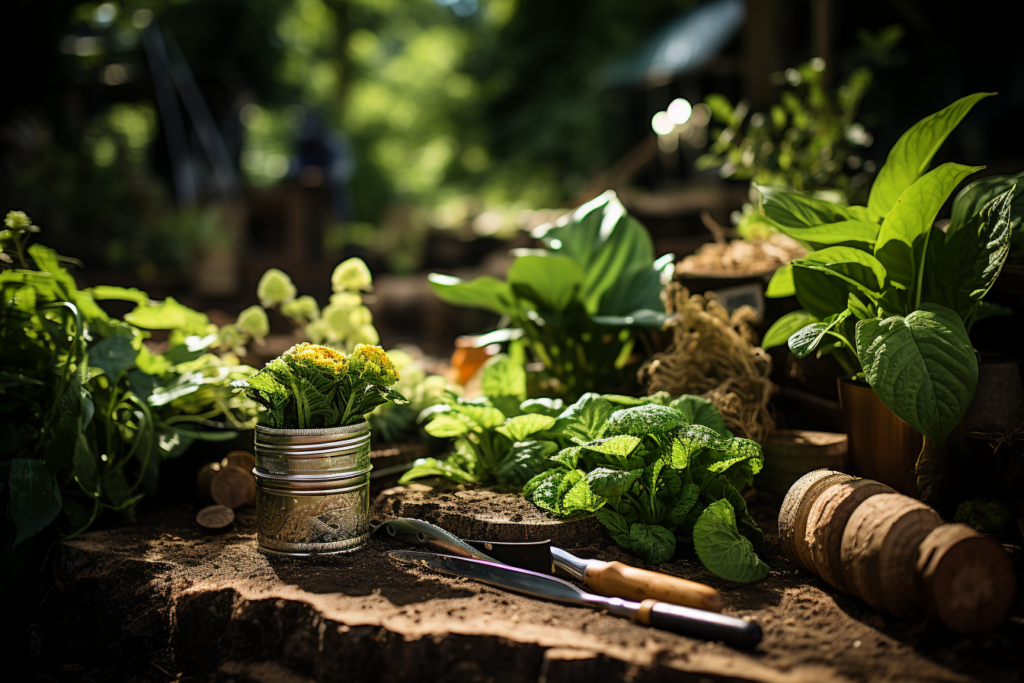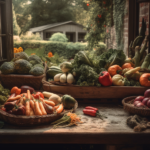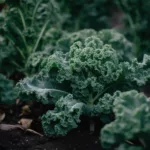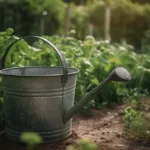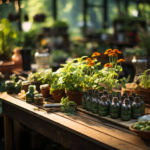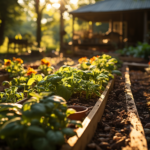Table of Contents
Welcome to The Essential Guide to Kitchen Garden Fertilizers: Feeding Your Plants! Growing your own fresh herbs, veggies, and fruits in your backyard is one of the most rewarding experiences one can have. But, growing a successful kitchen garden requires more than just planting the seeds and watering the soil. Proper nutrition is a crucial factor in the growth and productivity of plants. That’s why we created this comprehensive guide to help you understand the importance of fertilizers, how they work, and which fertilizers are best for your kitchen garden. With the right fertilizer, you can enrich the soil and provide your plants with all the necessary nutrients needed to achieve a bountiful, healthy harvest. Let’s dive in!
Why Fertilization is Important for Kitchen Garden Plants
When it comes to growing your own fresh produce, few things are more satisfying than stepping out into your own garden and picking a ripe tomato or crisp lettuce. However, in order to achieve a bountiful and nutritious harvest, proper fertilization is absolutely essential. In this section, we will discuss the reasons why fertilization is so important for kitchen garden plants.
Rich Soil
At the core of healthy and productive plants, lies rich soil that is filled with all the necessary nutrients that plants require. By using fertilizers that are tailored to your particular plants, you can enrich the soil and ensure that it has the necessary nutrients for strong growth and productivity.
Maximum Nutrient Uptake
Just like humans, plants have different nutrient requirements at different stages of their life. By using fertilizers that are designed to meet these changing needs, you can ensure maximum nutrient uptake and healthy growth. In the absence of proper nutrients, plants can become stunted and even die.
Better Yield
The ultimate goal of any kitchen gardener is to produce a bountiful yield of fresh and nutritious fruits and vegetables. By providing your plants with proper fertilization, you can help boost their yield potential and ensure that they are producing the best quality produce possible.
Pest and Disease Resistance
When plants are well-fed, they are better equipped to fight off pests and disease. Proper fertilization can help improve the overall health and vigour of your plants and make them more resistant to harmful pests and diseases.
In summary, proper fertilization is absolutely essential to the success of your kitchen garden. By providing your plants with the necessary nutrients, you can ensure strong growth and healthy productivity. In the following sections, we will dive deeper into the different types of fertilizers available and how to best use them for your particular plants.
Different Types of Fertilizers for Different Kinds of Plants
When it comes to fertilizing kitchen garden plants, you’ll quickly discover that not all fertilizers are created equal. The type of fertilizer you use depends on the specific needs and preferences of your plants. Here are some different types of fertilizers that are commonly used for kitchen garden plants:
Compost
Compost is the go-to fertilizer for organic gardeners. It’s made from decaying organic matter like leaves, grass clippings, and kitchen scraps. Compost is a slow-release fertilizer that promotes healthy soil structure, water retention, and nutrient availability. It’s also easy to make your compost at home, which makes it a cost-effective option.
Organic Fertilizers
Organic fertilizers are derived from natural sources like animal waste, bone meal, and dried blood. They’re a great option for gardeners who want to avoid synthetic fertilizers. They provide slow-release nutrients to plants and improve soil structure and water retention.
Synthetic Fertilizers
-
- Synthetic Fertilizers
Synthetic fertilizers are chemical-based fertilizers that provide plants with an instant and concentrated dose of nutrients. They’re often cheaper and easier to obtain than organic fertilizers, but they can have negative effects on the environment and soil quality if not used correctly.
-
-
- Liquid Fertilizers
-
Liquid fertilizers are used to provide plants with quick nutrients, and they’re commonly used for plants in containers or those that aren’t performing well. They’re easy to apply and can be mixed with water, making them convenient to use.
Conclusion
Selecting the right fertilizer for your kitchen garden plants is essential to ensure healthy growth and maximum yield. Knowing the different types of fertilizers available can help you choose the most appropriate one for your plants’ needs. Whether you opt for organic or synthetic fertilizer, it’s recommended to use only what’s needed. Over-application of fertilizers can be detrimental to the environment and cause nutrient imbalances in the soil.
Synthetic Fertilizers: Pros and Cons
Synthetic fertilizers had been widely used in agricultural industries to increase plant growth. The following discusses the pros and cons of synthetic fertilizers in Kitchen Garden plants.
What are synthetic fertilizers?
Synthetic fertilizers are chemical formulations that promote plant growth and supplement nutrients. These fertilizers are commercially produced, and their nutrient content is carefully controlled, allowing for a more even distribution of nutrients to plants. There are three essential macronutrients provided by fertilizers, including nitrogen, phosphorous, and potassium. Synthetic fertilizers contain all three in varying proportions.
Pros of Synthetic Fertilizers
-
-
-
- Fast-acting: Synthetic fertilizers are fast-acting and provide fast results. When plants need an immediate nutrient boost, synthetic fertilizers are an excellent option.
-
-
-
-
-
- Convenient and Easy to Use: They are widely available, easy to handle, and store. It can be found in most garden stores and is pre-packaged, making them easy to use.
-
-
-
-
-
- Exact concentration of nutrients: Synthetic fertilizers provide a precise balance of nutrients to your plants, promoting optimum growth and health.
-
-
Cons of Synthetic Fertilizers
-
-
-
- Harms Microorganisms: The chemicals in synthetic fertilizers harm the beneficial microorganisms that might be present in the soil.
-
-
-
-
-
- Environmental Pollution: The excessive use of synthetic fertilizers can lead to soil and water pollution.
-
-
-
-
-
- Expensive: Synthetic fertilizers are often more expensive, especially if used over the long-term.
-
-
In conclusion, synthetic fertilizers have pros and cons when it comes to Kitchen Garden plants. It is important to use them correctly and not depend too much on them. When used in moderation, synthetic fertilizers can help promote growth, development, and enhance plant growth. It is best to explore different types of fertilizers and use a combination of synthetic and organic fertilizers to balance the impact on your plants.
– How to Choose the Best Fertilizer for Your Kitchen Garden
How to Choose the Best Fertilizer for Your Kitchen Garden
Choosing the right fertilizer for your kitchen garden can be overwhelming, with so many options available in the market. But, there are a few things to keep in mind to help narrow down the choices and determine which fertilizer is right for your specific needs. Here are some essential things to consider:
-
-
-
- Identify your soil type
-
-
The first step in selecting a fertilizer is to identify your soil type. Knowing your soil type will help you understand which nutrients are already present in the soil and which ones need to be supplemented. You can conduct a simple soil test to determine the pH level and nutrient levels of your soil.
-
-
-
-
- Focus on the primary nutrients
-
-
-
All fertilizers provide essential nutrients that plants need to grow, but there are three primary nutrients that are crucial for plant growth: nitrogen, phosphorus, and potassium. Look for a fertilizer that provides a balance of all three nutrients, or one that is tailored to your specific crop’s needs.
-
-
-
-
-
- Consider the release mechanism
-
-
-
-
Fertilizers can come in many forms, including liquids, granules, and spikes. Each type of fertilizer has its release mechanism, which determines how quickly the nutrients are available for the plants. Some fertilizers release nutrients quickly, while others release slowly over an extended period. Consider your plant’s growth stage and choose a fertilizer that matches its needs.
-
-
-
-
-
-
- Organic or synthetic?
-
-
-
-
-
Finally, consider whether to use organic or synthetic fertilizers. Organic fertilizers are made from natural sources and take longer to release their nutrients into the soil, providing a slow and steady supply of nutrients. Alternatively, synthetic fertilizers are often cheaper and release nutrients quickly.
In conclusion, selecting the right fertilizer for your kitchen garden can significantly improve plant growth and yields. Consider your soil type, the primary nutrients needed, release mechanism, and organic or synthetic options when selecting the perfect fertilizer for your plants. By following these essential guidelines, you can choose a fertilizer that ensures a healthy abundant crop.
Conclusion
In conclusion, there are various types of fertilizers to choose from, but selecting the right one for your kitchen garden plants will ultimately depend on the specific needs of your soil and crops. As we’ve learned, synthetic fertilizers can provide quick results, but they may have environmental drawbacks. On the other hand, organic fertilizers are typically more environmentally friendly and can also build healthier soil over time. By understanding the importance of fertilization and exploring the different fertilization options available, you can keep your kitchen garden healthy and productive all season long. With some care, attention, and a little help from the right fertilizer, you’ll have a flourishing garden in no time!

